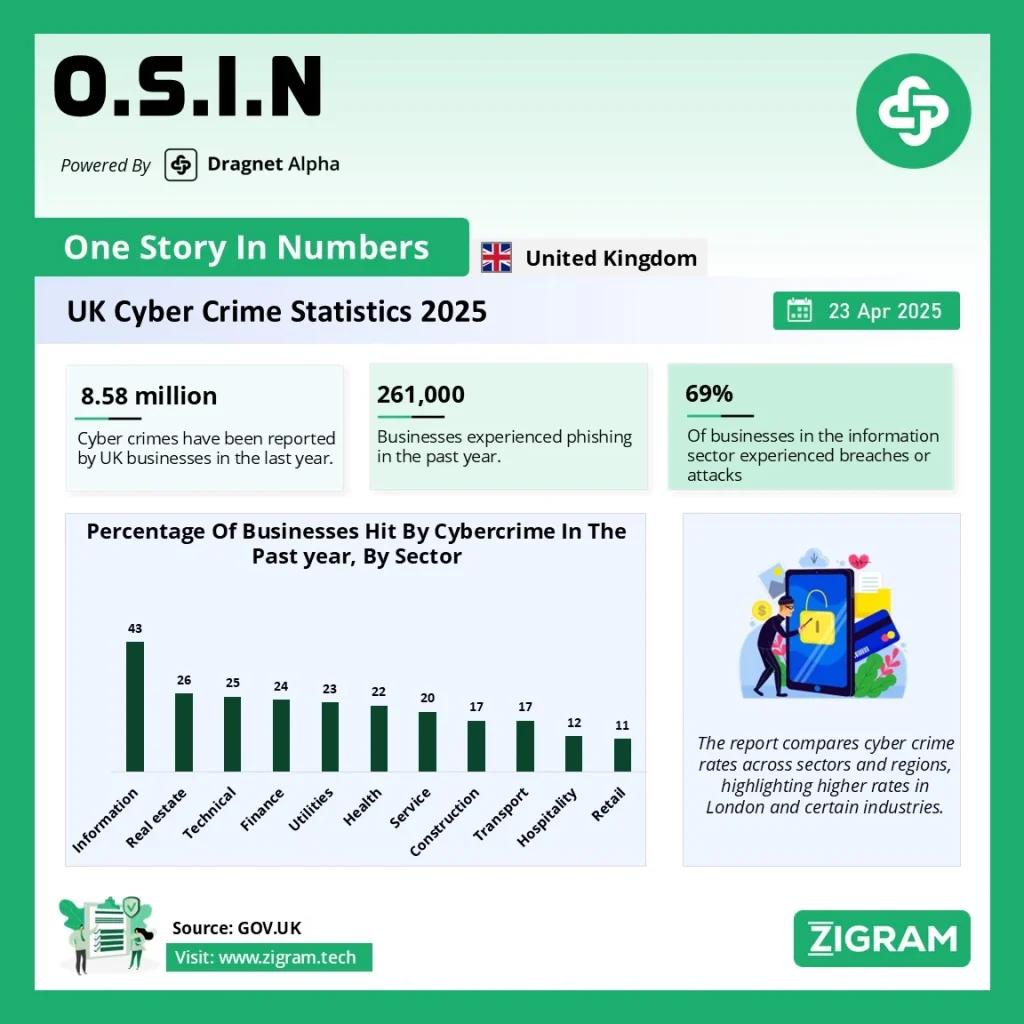Cyber Security Breaches Survey 2025: A Snapshot of Cyber Crime Across Business Sectors
The Cyber Security Breaches Survey 2025, published by the UK government, provides a detailed overview of the prevalence of cyber crimes and security breaches experienced by businesses across various sectors. This year’s survey highlights the ongoing concerns businesses face regarding cyber threats, with notable differences observed among industries. It paints a comprehensive picture of the growing risks and challenges that companies must navigate to safeguard their operations.
Cyber Crime: A Growing Threat Across Business Sectors
According to the survey, 20% of businesses overall reported experiencing cyber crime within the last 12 months. However, there were significant sectoral differences in the likelihood of businesses encountering cyber crimes. Companies in the information or communications sector were found to be at a much higher risk, with 43% of businesses in this sector reporting a cyber crime. This is nearly double the overall business average, emphasizing the sector’s vulnerability due to its reliance on digital infrastructure and data management.
In contrast, businesses in the food or hospitality (12%) and retail or wholesale (11%) sectors were less likely to experience cyber crime. These industries, while not immune to cyber threats, seem to face comparatively lower risks, possibly due to fewer digital touchpoints or lower perceived value of their data from cybercriminals.
Breach and Attack Trends: A Sector-Specific Outlook
When examining broader security issues such as breaches or attacks—whether or not they resulted in cyber crime—the information or communications sector again stood out. A significant 69% of businesses in this sector reported experiencing a breach or attack, much higher than the 43% experienced by businesses overall. This suggests that while the sector may face a higher volume of cyber attacks, not all of them necessarily lead to cyber crime, highlighting a distinction between attempted breaches and successful criminal activity.
On the other hand, the administration or real estate sector (48%) did not experience a higher-than-average rate of breaches or attacks compared to the overall business average. This indicates that although businesses in this sector were more likely to face cyber crime (26%), they did not face an outsized number of general security incidents.
Decreasing Incidents in Retail and Wholesale
One notable trend from the 2025 survey is the significant decline in the proportion of businesses in the retail or wholesale sector experiencing cyber crime. The number dropped from 18% in 2024 to 11% in 2025. This decrease may indicate that businesses in this sector are taking stronger preventive measures or that cybercriminals are shifting focus to other, more vulnerable industries. Regardless, it’s a positive development that reflects the impact of evolving cyber security practices.
Regional Differences: London at a Higher Risk
Geography also plays a role in cyber crime prevalence. Businesses in London were more likely than those in other regions to experience cyber crime, with 27% of London-based businesses reporting incidents in the last year, compared to the national average of 20%. This disparity may be influenced by a variety of factors, including the concentration of high-value targets, the density of digital infrastructure, and the distribution of certain business sectors in the region.
Industry Insights: Targeted Strategies for Protection
The Cyber Security Breaches Survey highlights the importance of sector-specific strategies in combating cyber threats. Industries like information or communications and finance, which are more digitally dependent, must invest heavily in advanced security measures to prevent breaches and attacks. These sectors should prioritize staff training, robust data protection policies, and frequent system audits to mitigate risks.
Conversely, sectors like food and hospitality may focus on enhancing basic security protocols, such as regular software updates and network monitoring, to reduce their vulnerability. The continued awareness of the threat landscape across all sectors is essential in minimizing the impact of cyber crime on UK businesses.
Conclusion: A Call for Proactive Cyber Security Measures
The findings from the Cyber Security Breaches Survey 2025 underscore the importance of ongoing vigilance against cyber threats. With certain industries more prone to cyber crime and breaches, it is clear that businesses must adopt proactive and tailored cyber security strategies. Whether through industry-specific solutions or regionally-focused interventions, the key to reducing cyber risk lies in comprehensive, well-implemented cyber defenses that stay ahead of evolving threats.
As cybercrime continues to adapt and grow, businesses must invest in understanding their unique risks and fortifying their digital infrastructure to ensure resilience in the face of increasing cyber threats.
Read the full report here.
Please read about our product: Dragnet Alpha
Click here to book a free demo
- #CyberSecurity
- #CyberCrime
- #CyberThreats
- #DataProtection
- #BusinessSecurity
- #DigitalRisks
- #UKCyberSecurity
- #CyberBreach
- #CyberAwareness
- #DataBreach
- #SecurityBreaches
- #BusinessProtection
